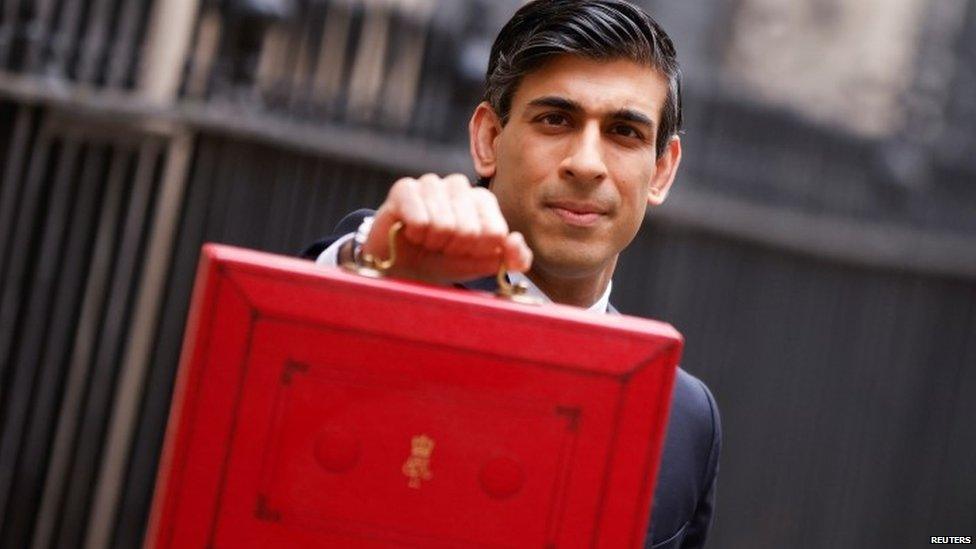What does the UK budget mean for Scotland?
- Published
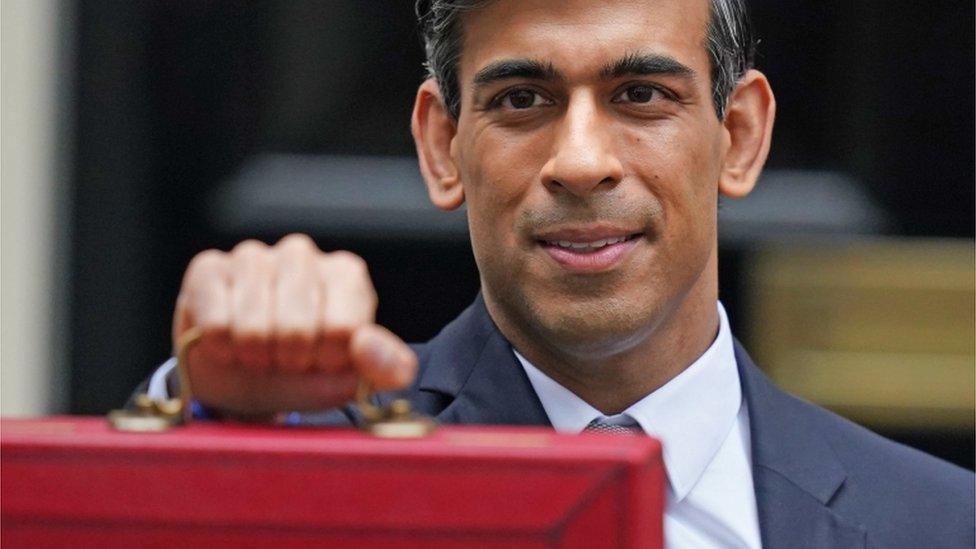
Rishi Sunak said his budget plans delivered for the whole of the UK
Chancellor Rishi Sunak has pledged a "new economy" while increasing UK government spending by £150bn. But what does his Autumn Budget mean for Scotland?
While many of the decisions about tax and spending in Scotland are made in Edinburgh, the UK Budget still has a big impact - well beyond the simple question of how much cash goes into Holyrood's coffers.

Holyrood's budget
Mr Sunak has opted to turn on the spending taps across every government department, and this means Scottish Finance Secretary Kate Forbes will have more cash to allocate when she sets out her own draft budget in December.
This is because many of the eye-catching announcements in the UK budget relate to matters which are devolved to Holyrood - for example the £24bn earmarked for housing or the £21bn for roads.
North of the border, Scottish ministers are in charge of housing and transport. So when the Chancellor pledges fresh funding to these areas, an extra chunk of cash is added to the Scottish budget to balance things up and ensure Scottish taxpayers don't end up subsidising giveaways in England.
The windfall is calculated based on population levels using the Barnett Formula, and Scottish ministers can spend the cash on whatever they want - this is rather the point of devolution.
Mr Sunak said his spending spree would send an average of £4.6bn per year extra to Holyrood, resulting in "the largest block grants for the devolved administrations" since they were established.
However, Ms Forbes contends this is still not enough to deal with the "significant challenges" facing Scotland in the wake of the pandemic.
She also says it is important to "get behind the rhetoric and understand what the figures mean" before she announces her own spending plans on 9 December.
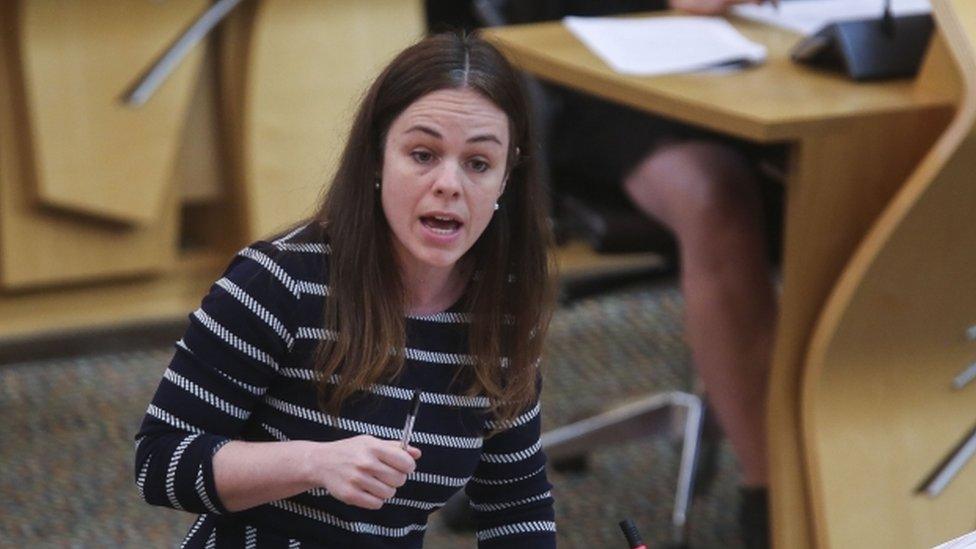
Kate Forbes will set out the Scottish government's budget plans in December
Direct spending
Not all spending in devolved areas triggers Barnett consequentials. As of this year, some cash is actually going around Holyrood and directly to local projects.
The UK government has established a £4.8bn "levelling up" fund, which allows local authorities to bid for cash for things like building roads and bridges, refurbishing museums and installing electric vehicle charging points. Mr Sunak told MPs that this year, £170m had been awarded to Scottish projects.
These include the redevelopment of Inverness Castle, the renovation of the Westfield Roundabout in Falkirk, and a new marketplace in Aberdeen city centre - each of which is getting £20m of funding.
A redevelopment of the Artizan shopping centre in Dumbarton is getting another £20m, while £38m will be spent improving travel links between Paisley and a local manufacturing innovation hub, external.
Up to £3m is also being committed to the Burrell Collection in Glasgow in a bid to bring world-class art exhibitions to the city, while another £1m is being spent on local projects via the Community Ownership Fund.
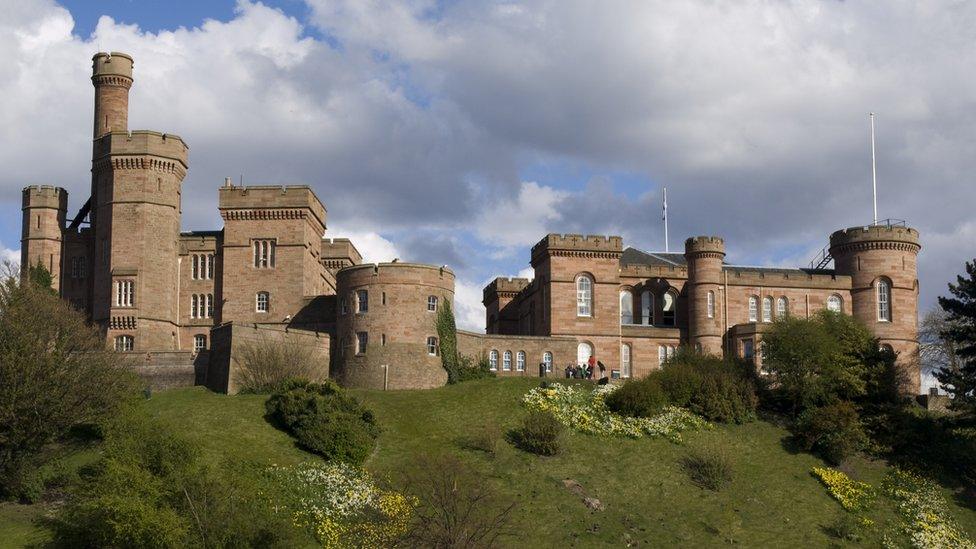
Inverness Castle is in line for a refit as part of the levelling up fund
This is partly to do with the government's "levelling up" agenda, an attempt to rebalance an economy previously seen as being skewed towards London and the south-east of England - while helpfully winning over former Labour voters in "red wall" constituencies in the north of England.
But it also plays into a longer-term Downing Street strategy to have a more visible presence in Scotland. UK ministers hope that by directly funding projects north of the border, they can write themselves into some local success stories and perhaps dampen enthusiasm for independence.
Scottish ministers meanwhile do not like the idea of being cut out of the loop, saying this "undermines devolution". They instinctively contest the idea that officials in London are better placed to assess the merit of funding bids than those in Edinburgh.
The political difficulty though is that these are positive projects backed by local councils - some of them SNP-run - and so extra cash for them cannot be opposed outright. Instead, the complaint tends to be more procedural, about the decision-making process and the complexity of the funding landscape.
This may also become a more common occurrence going forward, with the UK Shared Prosperity Fund set to replace EU structural funds in 2022 - again sparking complaints that Holyrood is being bypassed.
Taxes and benefits
A range of different taxes are devolved to Holyrood - but others are not, and the interplay between the two means changes announced at Westminster can still have far-reaching implications in Scotland.
For example, income tax rates and bands are devolved, with Scotland operating its own five-band system which the government in Edinburgh argues is fairer. However, the tax-free allowance is still reserved, which as the starting point where taxes kick in clearly has a knock-on effect on the entire system.
So what is actually changing, and what is not?
The national living wage is set UK-wide, so the increase there - to £9.50 an hour for over-23s - will apply north of the border.
And while an increasing range of welfare powers are being taken over by Social Security Scotland, Universal Credit is also reserved to Westminster - so the changes to the "taper rate", allowing working claimants to keep more of the money they earn as their wages increase, will also apply in Scotland.
Moving away from personal taxes, business rates are fully devolved to Holyrood as non-domestic rates - and the Scottish government has already committed to rates relief for the hospitality and retail sectors.
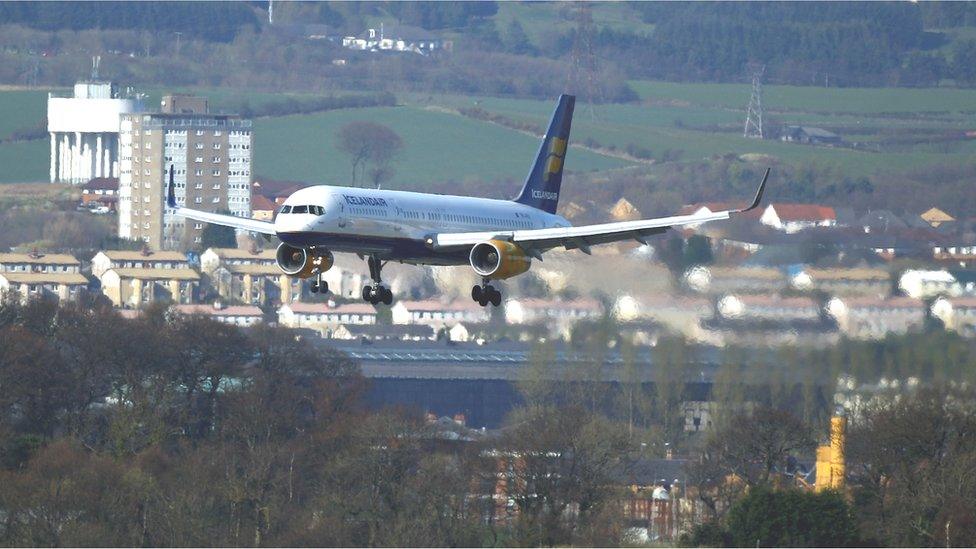
The Scottish government dropped its own plans for an air passenger duty cut in 2019
The cut to air passenger duty on domestic flights will apply in Scotland - Aberdeen and Inverness were specifically cited by the Chancellor as beneficiaries, although Inverness is actually exempt from the levy.
While there have long been plans to replace air passenger duty with a devolved Air Departure Tax, the move has been tied up in technical wrangles for years - chiefly because of that exemption for Highlands and Islands airports.
Incidentally, Scottish ministers wanted to do away with the levy entirely - but ditched this plan in 2019 citing environmental concerns. This has freed them up to raise an eyebrow at Mr Sunak's plan coming on the eve of the COP26 climate conference.
The overhaul of alcohol duties will have effect in Scotland too. While there is a system of minimum unit pricing in Scotland, this is not actually a tax, with retailers pocketing the proceeds of increased prices.
The freeze on current alcohol duty is also good news for the Scottish whisky industry, which had been lobbying against a planned increase.

Rishi Sunak seems determined that this is seen as a red, white and blue budget - a budget for the whole of the UK.
As he chose to put it: "We are, and always will be, one family - one United Kingdom".
That is obviously in dispute in Scotland where the SNP and others aspire to independence - so what did the Chancellor do to try and strengthen the Union?
As well as extra cash for the Scottish government, there is the so-called "levelling up" money which involves the UK government spending more directly in Scotland.
There's likely to be more of this after COP26 when UK ministers publish their Union connectivity review identifying cross-border transport investments.
The budget also included a cut to air passenger duty for internal UK flights which Mr Sunak said was designed to "bring people together across the UK".
There was even a UK-wide scheme to boost numeracy skills, although education is a Holyrood responsibility.
What nationalists might see as Treasury overreach was also a signal to unionists that this Chancellor is committed to their cause.

A tiny pub in the most inaccessible village in Scotland; a roundabout in Falkirk: a shopping centre in Dunbartonshire; the stable block in Glasgow's Pollok Park - the UK budget is going very local.
Over 22 years of devolution, it had become increasingly a spending budget for England, with devolved bells and whistles, and taxes that mainly covered the whole of the UK.
But that's changing. This budget marks a big shift towards the UK government planting its union flags on Scottish government turf.
The Levelling Up Fund offers £170m to Scottish projects, this year, and £400m over three years - money that would previously have gone through the block grant at Holyrood, for ministers there to allocate.
Community Ownership and Regeneration Funds also pick pet projects that show the difference some Whitehall money can make, backing some really small projects from Whithorn to Kinloch Rannoch.
An extension of that will come with the Shared Prosperity Fund, which will ramp up as European Union structural funds are wound down. That, too, will bypass Holyrood, because Westminster wants its own direct links to projects on the ground.
Related topics
- Published27 October 2021
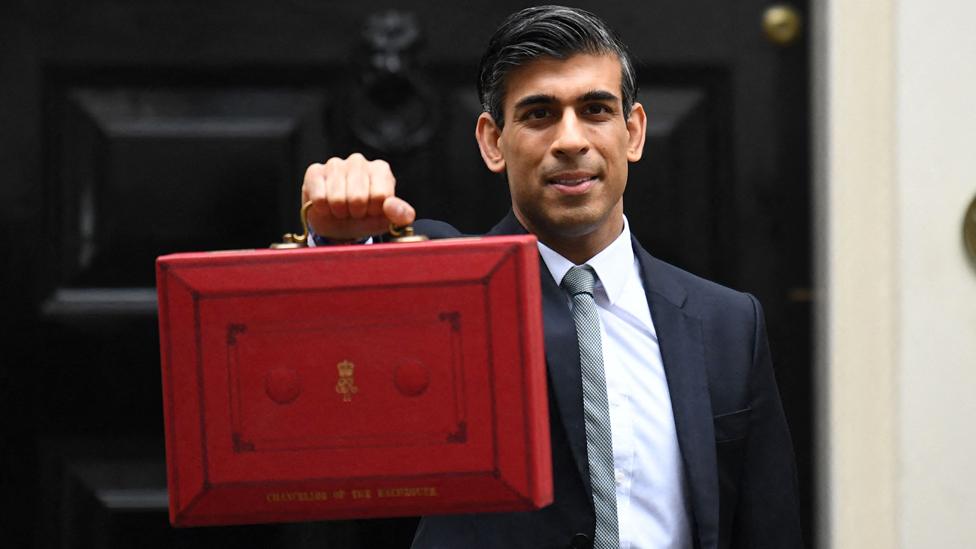
- Published27 October 2021

- Published26 October 2021
